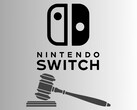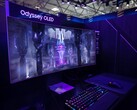Nintendo's stance on protecting its intellectual property is nothing short of legendary. The company's litigious nature is well-documented, yet it has always approached the emulation scene with more hesitance than things like ROM distribution sites, perhaps out of concern that losing a battle there could set legal precedent legitimising the practice. But this time it struck, and its sudden assertiveness is rather unsurprising when you dig into how far and into what territory Yuzu was overstepping.
While projects like RPCS3 or Project64 have largely been left to their own devices, given their focus on legacy consoles, the Switch still being in its commercial prime means that , and emulators for it start to intersect with Nintendo’s market interests. Ordinarily, this still might not be too huge of a problem, as the Switch's form factor and capabilities still set a game on it apart from the same game played on a PC or laptop. But the rapid advent of handheld PCs, most with horsepower far surpassing those of the Switch – and some like Lenovo's Legion Go (available on Amazon) even having an equivalent for its detachable Joy-Cons – have suddenly put Nintendo's ageing hardware into a tight spot, where other platforms are now unquestionably providing a better experience than its own.
Tropic Haze's practice of monetising its work, both on Yuzu and its Citra emulator for the 3DS, only added fuel to the fire. Much of the emulation world leans on fair use as a defence for their work, either explicitly or at least implicitly for things like preservation – but the offering of a dedicated early access channel in exchange along with secret features in exchange for a Patreon subscription scratched deeply into that ethical veneer. The $2.4 million settlement agreed alongside the shut-down of the project may indeed be a symbolic one on these grounds, too; when you multiply the Yuzu Patreon's $29,000 monthly earnings by the 84 months the Switch has been out to date, you get – you guessed it – $2.4 million!
But if promoting the ability to play Nintendo games day-and-date while making money off of it made the case for Yuzu's innocence even harder, how about making dramatically more money off of leaked releases? Because that's exactly what happened last May – when The Legend of Zelda: Tears of the Kingdom leaked two weeks early, and Yuzu's Patreon subscriber count just happened to double that same month. And, along with a claim of over a million pirated copies, court documents also claim that Yuzu fed back telemetry data to the development team, meaning they would've been fully aware as to the sheer extent of the piracy they were enabling.
The argument of piracy competing for regular sales of a game is one thing, but the situation here is another one entirely. The presence of platforms that offer the same feature but better performance, along with the availability of a tentpole game for that community well in advance of the official release, is a toxic combination that sees legitimate buyers being left behind in the dust, as second-class players. It's a situation that Nintendo surely wants to keep off the table for the sake of future games, and perhaps more importantly for the upcoming Super Switch (or Switch 2, if you want to stick to the boring name everyone else uses).
There are two curious points to note here as an epilogue, though, especially for those rolling their eyes at any defence of a large corporation that must obviously only ever have bad intent in mind. The first is that, being a settlement out of court, this case does not set any kind of precedent that could be leveraged to bring the pain against other projects; the second is that another prominent Switch emulator, Ryujinx, was left untouched.
So, though it may leave a broader chilling effect on the community as a whole, this focused and targeted legal action seems to send a clear message – Yuzu's crime was not emulation in itself, but flying too close to the sun.
Source(s)
Own, Graphtreon

















